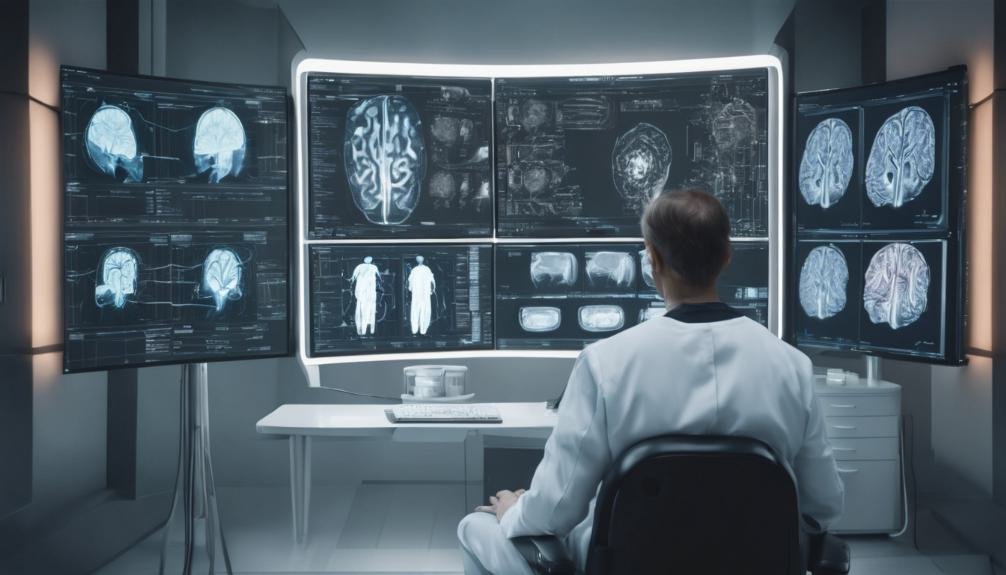AI in Neurology
Imagine a landscape where artificial intelligence seamlessly integrates into the intricate world of neurology, reshaping how we approach brain-related disorders and treatments. As you explore the depths of this fusion, you'll uncover how AI algorithms are not just refining diagnostics but also customizing therapies to cater to individual neurological nuances. The potential implications are vast, promising a future where neurological care is not only more precise but also more compassionate. Curious to discover how AI is maneuvering through the complexities of the human brain?
Key Takeaways
- AI in neurology enhances diagnostic precision and accuracy.
- Remote monitoring enables real-time insights for patients.
- Personalized treatment plans improve patient outcomes.
- Challenges include data quality, ethics, and workflow integration.
- AI predicts neurological outcomes and assists in personalized care.
AI Applications in Neurology
AI is revolutionizing the field of neurology through its diverse applications in diagnosing, treating, and predicting neurological diseases. In neurosurgery, AI plays a pivotal role by enhancing surgical precision and outcomes through advanced imaging analysis and intraoperative decision support systems. Cognitive enhancement is another area where AI shows promise, with brain-computer interfaces enabling communication and control for individuals with neurological conditions.
AI diagnostics in neurology have proven to be highly effective, with algorithms capable of analyzing complex neurological data to aid in the early detection and monitoring of diseases. These AI systems can process vast amounts of information quickly, leading to more accurate diagnoses and personalized treatment plans for patients. By leveraging machine learning and pattern recognition, AI can identify subtle changes in brain structure and function that might otherwise go unnoticed by human clinicians.
Advantages of AI in Neurological Diagnosis
Utilizing advanced algorithms and machine learning capabilities, neurological diagnostics benefit greatly from the precision and efficiency that AI brings to the analysis of complex brain data.
Remote monitoring is one of the key advantages of AI in neurological diagnosis. AI systems can continuously analyze patient data from wearable devices or remote monitoring systems, providing real-time insights into neurological conditions without the need for frequent in-person visits. This remote monitoring capability allows for the early detection of potential issues, enabling timely interventions and improving patient outcomes.
Another significant advantage of AI in neurological diagnosis is cost efficiency. By streamlining the diagnostic process and reducing the need for extensive manual analysis, AI can lower healthcare costs associated with neurological assessments. AI algorithms can process vast amounts of data quickly and accurately, leading to faster and more accurate diagnoses. This efficiency not only saves time but also reduces the economic burden on healthcare systems and patients alike.
AI-Powered Treatment Personalization
You can enhance patient outcomes through AI-powered treatment personalization by creating tailored plans that cater to individual needs and characteristics. This precision in care guarantees that patients receive interventions that are optimized for their specific conditions, leading to more effective and targeted treatment strategies.
Tailored Treatment Plans
Tailoring treatment plans using AI algorithms has revolutionized the field of neurology, ensuring personalized care for each patient based on their unique characteristics and medical history. Through personalized interventions, tailored care, customized therapies, and individualized treatments, AI empowers neurologists to create precise and effective plans that cater to the specific needs of each individual.
By analyzing vast amounts of patient data, AI can identify patterns, predict responses to certain treatments, and recommend personalized approaches that optimize outcomes.
AI algorithms can sift through complex data sets, including genetic information, imaging results, and treatment histories, to generate tailored treatment plans that aren't only efficient but also patient-centered. This data-driven approach allows for a deeper understanding of each patient's condition, leading to more accurate diagnoses and targeted interventions.
Precision in Care
AI-driven precision in care transforms neurology by enabling personalized treatment plans that leverage advanced algorithms to analyze patient data for best outcomes. By harnessing the power of artificial intelligence (AI), healthcare providers can tailor interventions to individual patients, enhancing both patient outcomes and diagnostic accuracy.
Through AI algorithms, vast amounts of patient data, including genetic information, imaging results, and treatment responses, can be processed rapidly and effectively. This data-driven approach allows for the identification of subtle patterns and correlations that might be overlooked by traditional methods.
As a result, neurologists can make more informed decisions regarding treatment strategies, medication adjustments, and therapy plans. Moreover, AI-powered precision in care enhances diagnostic accuracy by providing clinicians with real-time insights and predictive analytics.
Challenges in Implementing AI in Neurology
You face challenges in implementing AI in neurology due to concerns about data quality, which directly impacts the accuracy and reliability of AI algorithms.
Ethical implications surrounding patient privacy, consent, and decision-making must be carefully navigated to guarantee compliance with regulations and ethical standards.
Integrating AI seamlessly into clinical practice requires overcoming barriers related to workflow integration, physician acceptance, and ensuring that AI augments rather than replaces human expertise.
Data Quality Concerns
One of the primary obstacles hindering the successful implementation of AI in neurology is the pervasive issue of data quality concerns. Data integrity, essential for accurate algorithm performance, is often compromised in neurology datasets due to various factors. Inaccurate data entry, inconsistent formatting, and missing values can all greatly impact the reliability of AI algorithms utilized in diagnosing and treating neurological conditions.
Algorithm accuracy is heavily reliant on the quality of input data. In neurology, where the margin for error is minimal and outcomes are critical, ensuring the accuracy and consistency of data is paramount. Even minor discrepancies or errors in the data can lead to skewed results, compromising the effectiveness of AI systems in assisting healthcare professionals.
Addressing data quality concerns in neurology requires meticulous attention to detail during data collection, storage, and preprocessing stages. Implementing robust data validation processes, regular audits, and standardized protocols can help mitigate these challenges and enhance the reliability and efficacy of AI applications in neurology.
Ethical Implications
Ethical considerations present significant challenges in the integration of AI technologies within the field of neurology. Patient autonomy and data privacy are key aspects that must be carefully navigated. Ensuring that individuals have control over their own medical decisions and that their personal information remains secure is paramount. Informed consent becomes a critical issue when AI algorithms are used to assist in diagnosis or treatment planning. Patients must understand how their data is being utilized and have the opportunity to consent to its use.
Algorithm bias is another ethical concern that arises in the application of AI in neurology. Biases within algorithms can lead to disparities in patient care, affecting certain demographics more than others. It's essential to address and mitigate these biases to guarantee fair and accurate outcomes for all individuals. Transparency in the development and utilization of AI algorithms is essential to identify and rectify any biases present.
Integration With Practice
The implementation of AI in neurology practice encounters multifaceted challenges requiring meticulous consideration and strategic planning. One key challenge is ensuring that AI technologies positively impact patient outcomes.
While AI has the potential to enhance diagnostic accuracy and treatment effectiveness, its successful integration into clinical workflows is vital for maximizing these benefits. Clinical integration involves seamlessly incorporating AI tools into existing practices, which often requires significant changes in workflows and staff training.
Furthermore, the complexity of neurological conditions poses unique challenges for AI implementation. The variability in symptoms and disease progression necessitates sophisticated algorithms capable of handling diverse data inputs. Additionally, the reliance on large datasets for training AI models can be a barrier in neurology due to the scarcity of detailed neurological data.
To overcome these challenges, collaboration between neurologists, data scientists, and technology experts is essential. By working together to address issues related to patient outcomes and clinical integration, the potential of AI in neurology can be fully realized.
AI for Predicting Neurological Outcomes
Utilizing artificial intelligence (AI) algorithms for the prediction of neurological outcomes has shown promising results in various clinical settings. AI predictive modeling, a subset of machine learning, plays an essential role in analyzing vast amounts of patient data to forecast individual patient outcomes. By leveraging advanced algorithms, AI can assist healthcare professionals in predicting the effectiveness of treatments for neurological conditions.
Machine learning algorithms can identify patterns within patient data that may not be readily apparent to human clinicians. These patterns can help predict how a patient with a specific neurological condition may respond to different treatment options, allowing for more personalized and effective care plans.
By considering a multitude of variables simultaneously, AI predictive modeling can enhance the accuracy of outcome predictions and improve patient care outcomes.
In essence, the integration of AI for predicting neurological outcomes holds significant potential in revolutionizing how healthcare providers approach treatment planning and decision-making, ultimately leading to better patient outcomes and enhanced overall quality of care.
Ethical Considerations in AI Neurology
When implementing AI in neurology, it's essential to address the ethical considerations that arise from utilizing advanced algorithms in healthcare decision-making. Patient autonomy is an important aspect to take into account when integrating AI systems as they can influence treatment choices. Ensuring that patients have a say in decisions made by AI tools is vital to uphold ethical standards.
Privacy concerns must also be carefully managed to safeguard patient data from unauthorized access or misuse.
Bias mitigation is another critical ethical consideration in AI neurology. Algorithms must be designed to minimize biases that could lead to unfair or discriminatory outcomes. Transparency in algorithms is key to achieving this, allowing healthcare providers to understand how decisions are being made and ensuring accountability.
Future Trends in AI Neurology
Implementation of AI in neurology is poised to revolutionize the field by enhancing diagnostic accuracy and treatment efficacy through advanced algorithms and machine learning techniques.
AI-driven diagnostics are a key future trend in neurology, offering the potential to analyze complex neurological data rapidly and accurately. By leveraging AI algorithms, healthcare professionals can achieve more precise diagnoses, leading to tailored treatment plans and improved patient outcomes.
Furthermore, a significant focus of future trends in AI neurology is neurological disease prevention. AI technologies can sift through vast amounts of patient data to identify patterns and risk factors associated with neurological disorders. This data-driven approach allows for the early detection of potential neurological issues, enabling proactive interventions and lifestyle modifications to mitigate risks.
Preventive strategies informed by AI can empower individuals to take control of their neurological health and reduce the burden of neurological diseases on healthcare systems. As AI continues to evolve, its role in neurological disease prevention is expected to become increasingly prominent.
Impact of AI on Neurological Research
AI has greatly impacted neurological research by revolutionizing data analysis and accelerating advancements in understanding brain functions and disorders. Through the utilization of machine learning algorithms, AI enables researchers to analyze vast amounts of data efficiently, identifying patterns and correlations that may have previously gone unnoticed. This has a profound effect on patient outcomes, as AI can assist in the early detection of neurological disorders, leading to timely interventions and improved treatment strategies.
Moreover, AI has facilitated research collaboration by providing a platform for data sharing and multidisciplinary teamwork. Researchers can now collaborate on a global scale, pooling resources and expertise to tackle complex neurological challenges. This collaborative approach not only accelerates the pace of research but also enhances the quality and reliability of findings.
Conclusion
To sum up, AI in neurology brings unparalleled advancements in diagnostic accuracy, treatment customization, and outcome forecasting.
But, can AI truly revolutionize the field of neurology, or will inherent challenges hinder its full potential?
As technology continues to evolve, the future of AI in neurology holds immense promise for improving patient care, driving research innovation, and ultimately enhancing neurological health outcomes.
Stay tuned for the next wave of AI-driven breakthroughs in neurology.







